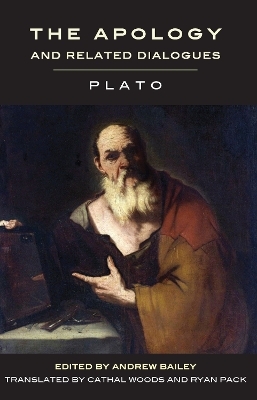
The Apology and Related Dialogues
Seiten
2016
Broadview Press Ltd (Verlag)
978-1-55481-258-5 (ISBN)
Broadview Press Ltd (Verlag)
978-1-55481-258-5 (ISBN)
What survives of Socrates’ philosophical thought are second-hand descriptions of his teachings and conversations - most famously, the accounts of his trial and execution composed by his friend, student, and philosophical successor, Plato. These dialogues contain some of the most fascinating and well-known arguments in Western philosophy.
Socrates, one of the first of the great philosophers, left no written works. What survives of his thought are second-hand descriptions of his teachings and conversations—including, most famously, the accounts of his trial and execution composed by his friend, student, and philosophical successor, Plato. In Euthyphro, Socrates examines the concept of piety and displays his propensity for questioning Athenian authorities. Such audacity is not without consequence, and in the Apology we find Socrates defending himself in court against charges of impiety and corruption of the youth. Crito depicts Socrates choosing to accept the resulting death sentence rather than escape Athens and avoid execution. All three dialogues are included here, as is the final scene of Phaedo, in which the sentence is carried out.
Socrates, one of the first of the great philosophers, left no written works. What survives of his thought are second-hand descriptions of his teachings and conversations—including, most famously, the accounts of his trial and execution composed by his friend, student, and philosophical successor, Plato. In Euthyphro, Socrates examines the concept of piety and displays his propensity for questioning Athenian authorities. Such audacity is not without consequence, and in the Apology we find Socrates defending himself in court against charges of impiety and corruption of the youth. Crito depicts Socrates choosing to accept the resulting death sentence rather than escape Athens and avoid execution. All three dialogues are included here, as is the final scene of Phaedo, in which the sentence is carried out.
Plato (c. 427-347 BCE) was a Greek philosopher. Andrew Bailey is Associate Professor of Philosophy at the University of Guelph, Canada. Cathal Woods is Associate Professor of Philosophy at Virginia Wesleyan College, USA. Ryan Pack studied at Virginia Wesleyan College, USA.
Introduction
Who Were Plato and Socrates?
Plato
Socrates
What Was Plato’ Overall Philosophical Project?
What Is the Structure of These Dialogues?
Some Useful Background Information
The Political Context
The Religious Context
The Legal Context
Sophism
How Important and Influential Are These Dialogues?
Cast of Characters
Timeline
Suggestions for Critical Reflection
Suggestions for Further Reading
Translator’s Note
Euthyphro
Apology
Crito
Death Scene from Phaedo
Bibliography
Index
| Reihe/Serie | Broadview Editions |
|---|---|
| Übersetzer | Cathal Woods, Ryan Pack |
| Sprache | englisch |
| Maße | 140 x 216 mm |
| Gewicht | 132 g |
| Themenwelt | Geisteswissenschaften ► Philosophie ► Erkenntnistheorie / Wissenschaftstheorie |
| Geisteswissenschaften ► Philosophie ► Logik | |
| Geisteswissenschaften ► Philosophie ► Philosophie Altertum / Antike | |
| ISBN-10 | 1-55481-258-5 / 1554812585 |
| ISBN-13 | 978-1-55481-258-5 / 9781554812585 |
| Zustand | Neuware |
| Haben Sie eine Frage zum Produkt? |
Mehr entdecken
aus dem Bereich
aus dem Bereich
die Grundlegung der modernen Philosophie
Buch | Softcover (2023)
C.H.Beck (Verlag)
18,00 €
Buch | Softcover (2023)
Reclam, Philipp (Verlag)
7,00 €

![Was heißt Denken?. Vorlesung Wintersemester 1951/52. [Was bedeutet das alles?] - Martin Heidegger](/media/113619842)
